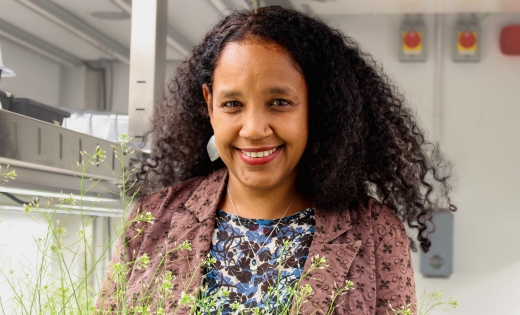
Yoselin Benitez-Alfonso, a Professor in Interdisciplinary Plant Science at the University of Leeds, has offered her insights to N8 in building and contributing to a healthy research culture.
Dr Benitez-Alfonso is originally from Cuba, but has travelled across the world working and studying in laboratories in Spain, the United States and the UK. She is now based in Leeds and has been for 11 years. She discussed in our interview from her experience, what has made her journey across the world easier and what she believes will help make relocating for future researchers easier. She explained how university efforts to welcome foreign students and staff also cultivate a sense of belonging for British individuals of all ethnic backgrounds who may not usually feel represented within academia. From our interview, it was clear Yoselin’s outlook on research culture offers a future where researchers are diverse, equal and always included.
She then explained that with the current push for international collaboration and recruitment for foreign researchers to join teams in the UK, there needs to come a sense of community for those relocating here. Without an inclusive research culture, there is “no point” bringing talent here as they are not going to feel welcome and able to “give the best of themselves”. This became apparent to Yoselin herself, when she immigrated to the UK. With no family here and in a completely new environment, she found that the support of her supervisors enabled her to “really sink in” to her work, helping her to succeed. To foster a truly inclusive research culture in the UK, it is essential to address the needs of individuals who have relocated here. Ensuring that these individuals are supported is crucial to prevent the research community from becoming an exclusive domain and to prime innovation.
Representation and support are important not only for existing researchers to feel welcomed, but for future researchers to feel like they have a place within academic institutions. Dr Benitez-Alfonso highlighted that by improving representation, future prospects may not feel there is such a large step between them and becoming a future leader in research. Having different ethnicities and genders represented on interview panels during recruitment and as part of staff cohorts giving lectures and leading groups will ensure that future leaders aim for the stars and don’t let their identity hinder their career prospects. Seeing someone that looks like you succeeding can make all the difference in how you perceive yourself and what you can achieve.
Yoselin’s commitment to diversity extends beyond her research lab to initiatives like the Black in Plant Science network. Recognising the lack of diversity in plant science, along with academia as a whole, she co-founded this network to provide support, resources, and a sense of community for black researchers in the field. Through activities, mentorship programs, and advocacy efforts, Yoselin amplifies underrepresented voices and challenges systemic barriers to inclusion—organisations such as WHEN highlight that only 66 of 23,000 professors in the UK are black women. There is a need for institutions to “look into what is limiting black female academics from proceeding to professorship” and progressing up the career ladder in general. Yoselin’s work can be used as an example of how the black community as well as all ethnic minorities in academia can be supported to thrive in the current research culture.
Our talk with Dr Benitez-Alfonso highlighted the increased support required for a diverse cohort of researchers in the UK. Her approach to cultivating a healthy research culture embodies inclusivity, collaboration, and empowerment. Through her leadership style and advocacy for representation, Yoselin’s excellent work paves the way to a healthier research culture and importantly, a future where every researcher feels like they belong.